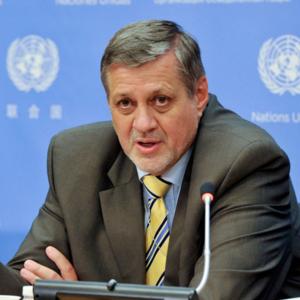Statement by SRSG for Iraq Jan Kubiš - World Interfaith Harmony Week
Bringing It All Together: An Action Plan to Promote and Protect Religious Harmony
Baghdad, Al Jilani Mosque, 10 February 2016
Esteemed participants,
At the outset, I would like to thank all the distinguished speakers and guests that have participated in the series of events to mark the World Interfaith Harmony Week as well as those institutions that hosted our events in Najaf, Baghdad and Erbil. These discussions have encouraged all of us to think about ways to promote the principles of tolerance, equality, justice and co-existence.
Esteemed participants,
Throughout this week, we have heard stories about the destructive impact of sectarian, religious and ethnic violence on many communities in Iraq. No religion, sect, nationality or ethnic group is immune to this disease and threat. Radical ideology and policies of sectarianism, violent extremism and terrorism that are in its most extreme form represented today by Daesh present a serious threat not only to peace and security; but if not curbed, will also be a threat to the unity of Iraq and its people.
We cannot allow the inciters of sectarian violence to pull communities into the cycle of violence and reprisals and drive a wedge between various components of Iraqi society. They ultimately serve the interests of terrorism.
Victims of sectarian-based attacks are incredibly vulnerable to manipulations of those that that seek to exploit their feelings of mistrust, discontent, exlusion and anger towards the state to incite them to radical action either in pursuit of distorted religious beliefs or as a means of retribution.
Esteemed participants,
During the Interfaith Harmony Week, influential personalities noted that the Iraqi political leaders, the government and COR have the primary responsibility in addressing the root causes of violent extremism, intolerance, exclusion and disenfrenchment.
Firstly, they urged the legislators to reach consensus on repealing discriminatory legislation and implement policies that ensure the inclusion of individuals or communities that are vulnerable to violent extremism, as well as to ensure that minority communities have the necessary rights and protection to ensure and guarantee their future in their country. They should also agree on a law which would clearly criminalize hate speeches and propaganda that incites violent extremism. Tangible solutions to prevent sectarian and political exclusion should include amendments to or adoption of the Accountability and Justice Law, the National Guard Law and the General Amnesty Law.
Secondly, they urged the Government of Iraq to create the necessary conditions for the safe and sustainable return of displaced communities including ethnic and religious minorities to their places of origin voluntarily, freely and in full respect and protection of their rights. The Government must continue to exert all efforts to ensure that both central and local state authority is restored in the liberated areas as quickly as possible, so as to prevent incidents of violence against the local civilian population or returnees by rogue groups that usurpe law in their hands and to ensure accountability for any individual who perpetrates violations.
Thirdly, they urged the state to vigorously work for real and profound reforms to ensure good governance and elimination of corruption, inclusive and equitable access to employment opportunities, education, health and other services, effectively functioning economy and social justice. Without such reforms, the burden of the current economic fiscal and social crisis and austerity measures will only further alienate and radicalise many, mainly young people.
They also urged the government of Iraq to address the systemic weaknesses in the administration of justice in Iraq that have been a contributing factor to ongoing cycles of violence, to undertake criminal justice law reform to ensure full and equitable access to justice by all Iraq’s citizens, including by marginalized and disempowered groups and detainees.
Esteemed participants,
The participants also urged the government and political actors to take a lead role in countering narratives of sectarianism and religious intolerance with public messages that promote national unity, tolerance and peaceful co-existence.
They equally urged religious leaders to promote tolerance and understanding within and between communities by voicing their rejection of violent doctrines and emphasizing the peaceful, respectful and humanitarian values inherent in their religion.
The role of civil society, in particular women and youth was recognised as indispensable. Their roles allow them to shape familial and social norms and promote increased tolerance and non-violent political and civil engagement. Empowering women and youth is a critical responsibility of political and religious leaders of Iraq.
Both civil society organizations and traditional tribal mechanisms can be powerful tools enabling communities to react constructively to signs of radicalization notably in their children. They can also enable victims to transform their loss and suffering into a constructive force for preventing violent extremism through community and tribal reconciliation and transitional justice.
The media including social media have a major responsibility in preventing and countering the narratives and drivers of violent extremism, hate, intolerance and sectarianism.
Last but not least, participants rightly recognized the need to reform education curriculum and promote tolerance and non-sectarian approaches, a true Iraqi identity and patriotism.
In this regard, I welcome Minister of Higher Education, Hussein Al-Sharistani’s commitment to introduce concepts of religious tolerance and dialogue in the school curriculum.
Esteemed participants,
The participants in The World Interfaith Harmony sent a strong appeal to the state to implement confidence-building measures that would promote tolerance, equality, justice and respect for diversity thus, working also for national reconciliation, for historic compromise that will preserve unity of Iraq and in people. It is, thus, for political forces to finally overcome political divisions that so far prevented progress in this area, in implementing what is essentially a critical part of the program of the government and the National Political Accord.
As we are closing this year’s World Interfaith Harmony Week, I would like to reiterate my deep appreciation to our distinguished guests and participants, and the United Nations’ readiness to contribute to implementing the recommendations which came out of this eventful and rich week.
Thank you.
Speech by



